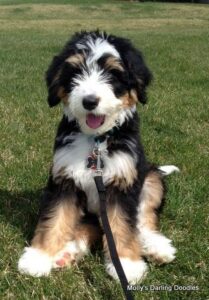
Bernedoodle puppies have taken the hearts of dog lovers everywhere by storm. Known for their fluffy coats, adorable faces, and friendly personalities, these puppies are quickly becoming one of the most popular mixed-breed dogs in the world. In this guide, we’ll cover everything you need to know about Bernedoodle puppies – from their origin and temperament to grooming and training tips. So if you’re considering adding one of these lovable pups to your family, read on to find out what makes the Bernedoodle such an amazing companion!
What is a Bernedoodle?
A Bernedoodle is a cross between a Bernese Mountain Dog and a Poodle. This hybrid breed combines the intelligence and hypoallergenic coat of the Poodle with the loyal and gentle temperament of the Bernese Mountain Dog. Bernedoodles are known for being great family pets, as they are playful, loving, and excellent with children.
History of the Bernedoodle

Bernedoodles are a relatively new breed, first developed intentionally in the early 2000s. Unlike some other hybrid dogs, Bernedoodles were bred with the purpose of creating a dog that would combine the best traits of the Bernese Mountain Dog and the Poodle. Sherry Rupke, a Canadian breeder, is credited with creating the first Bernedoodles and popularising them as a unique, family-friendly breed.
Since then, Bernedoodles have grown in popularity worldwide, becoming a favourite among dog owners who want a loyal, low-shedding companion with a great temperament.
Appearance and Size
Bernedoodles come in various sizes and colours, largely depending on the size of the Poodle parent. The three main sizes are:
- Standard Bernedoodle: Bred from a standard Poodle, these Bernedoodles can weigh between 70-90 pounds and stand around 23-29 inches tall.
- Mini Bernedoodle: With a miniature Poodle parent, Mini Bernedoodles usually weigh between 25-49 pounds and stand about 18-22 inches tall.
- Tiny Bernedoodle: Bred from a toy Poodle, Tiny Bernedoodles weigh 10-24 pounds and stand 12-17 inches tall.
In terms of colour, Bernedoodles can inherit the striking black, white, and brown markings typical of the Bernese Mountain Dog. However, they may also come in a variety of other colours, including solid black, black-and-white, or even tri-color patterns. Their coat texture also varies from wavy to curly, depending on their genetics.
Temperament and Personality
It is well known that Bernedoodles are amiable and loving.. These puppies are typically very sociable and thrive on human interaction. They get along well with children, making them ideal family pets. Here are a few key characteristics that define the Bernedoodle temperament:
- Loyalty: Bernedoodles tend to be incredibly loyal, often forming strong bonds with their owners.
- Intelligence: Thanks to the Poodle influence, Bernedoodles are smart and can quickly pick up on training.
- Playfulness: These dogs love to play and enjoy activities such as fetch, hiking, and even agility training.
- Gentle Nature: Bernedoodles are known for their gentle disposition, making them great with children and other animals.
- Adaptability: Bernedoodles can adapt well to various living conditions, though they generally do best in homes with a yard.
Exercise and Energy Level
Bernedoodles are moderately active dogs. While they enjoy playtime and need regular exercise, they’re not as high-energy as some other breeds. A daily walk, combined with some playtime in the yard or at the park, is usually sufficient for a Bernedoodle.
It’s essential to keep Bernedoodles mentally stimulated, as they are intelligent dogs that can become bored if they’re not engaged. Consider puzzle toys, obedience training, or even agility courses to keep your Bernedoodle’s mind sharp.
Training Your Bernedoodle Puppy

One of the perks of owning a Bernedoodle is their train ability. Due to their Poodle heritage, Bernedoodles are typically quick learners and eager to please. However, the Bernese Mountain Dog side can sometimes bring a bit of stubbornness. Here are some tips to help you train your Bernedoodle puppy successfully:
- Start Early: Begin training and socialisation as soon as you bring your puppy home. The sooner they learn good behaviours, the better.
- Use Positive Reinforcement: Bernedoodles respond well to praise, treats, and rewards. Avoid using severe training techniques as they may cause worry or terror.
- Be Consistent: Set a routine for feeding, bathroom breaks, and exercise, and stick to it. This consistency will help your puppy adjust and understand what’s expected.
- Socialisation: Expose your puppy to different people, animals, and environments from an early age. This will help prevent fear or aggression later in life.
Grooming Needs
Owning a Bernedoodle requires regular grooming.. Their coats are usually low-shedding, making them a good choice for people with allergies. However, they do require regular grooming to keep their fur from becoming tangled or matted.:Bernedoodle Puppies
- Brushing: It’s recommended to brush your Bernedoodle’s coat several times a week. This helps prevent matting and keeps their coat looking shiny and healthy.
- Bathing: Bernedoodles only need to be bathed every few months, or as needed if they get dirty.
- Professional Grooming: Because of their coat type, many Bernedoodle owners choose to take their dogs to a professional groomer every 6-8 weeks for a trim.:Bernedoodle Puppies
- Nail Trimming and Ear Cleaning: Regular nail trimming and ear cleaning are essential for maintaining your puppy’s overall health.:Bernedoodle Puppies
Health and Lifespan
Bernedoodles are generally healthy dogs, though they can inherit certain health conditions from their parent breeds. Some common health concerns for Bernedoodles include:
- Hip Dyspepsia: A condition where the hip joint doesn’t fit into the hip socket properly.
- Elbow Dysplasia: Similar to hip dyspepsia but affecting the elbows, this can cause pain and arthritis.
- Skin Issues: Bernedoodles with curly coats may be more prone to skin infections if their coat isn’t kept clean and free of mats.:Bernedoodle Puppies
To minimize the risk of these health issues, choose a reputable breeder who tests their breeding dogs for genetic conditions. On average, Bernedoodles live between 12-15 years, depending on their size and overall health.
Diet and Nutrition:Bernedoodle Puppies
Feeding your Bernedoodle a balanced diet is essential for their health and well-being. Because Bernedoodles come in different sizes, consult your veterinarian for advice on the right portion sizes and types of food. Generally, a high-quality dog food that’s appropriate for your dog’s age, size, and activity level is best.
Make sure your Bernedoodle’s diet includes:
- High-Quality Protein: To support muscle development and energy.:Bernedoodle Puppies
- Healthy Fats: These help maintain a shiny coat and support brain function.
- Complex Carbohydrates: To provide sustained energy for active play and exercise.
- Vitamins and Minerals: Essential for overall health, especially for growing puppies.
Finding a Bernedoodle Puppy: Bernedoodle Puppies
If you’ve decided that a Bernedoodle is the right dog for you, the next step is finding a reputable breeder. Make sure you do thorough research and choose a breeder who prioritizes health and temperament over profit. Avoid puppy mills and online scams, and ask to see health clearances for both parent dogs.
You can also consider adopting a Bernedoodle. Although they are less common in shelters, some Bernedoodle rescues specialize in finding homes for these puppies.
Is a Bernedoodle Right for You?

Bernedoodles are wonderful companions, but they’re not the perfect fit for every family. Here are some factors to consider before bringing a Bernedoodle puppy home:
- Grooming Commitment: Bernedoodles need regular grooming, which can be time-consuming and expensive.
- Exercise Needs: While not overly active, Bernedoodles still require daily exercise and mental stimulation.
- Family-Friendly: Bernedoodles are fantastic with children, but they thrive in homes where they get plenty of attention.
- Space Requirements: Standard Bernedoodles, in particular, need space to move around. If you live in an apartment, a Mini or Tiny Bernedoodle may be a better option.
Final Thoughts: The Joy of Owning a Bernedoodle
Bernedoodles are loyal, affectionate, and fun-loving dogs that make fantastic pets for the right family. Their friendly personality and low-shedding coats make them suitable for a variety of households, whether you live alone, have kids, or already have other pets.
If you’re ready to bring home a Bernedoodle puppy, prepare for a lifetime of love, loyalty, and laughter. With proper care, training, and plenty of affection, your Bernedoodle will grow up to be a cherished member of your family.

